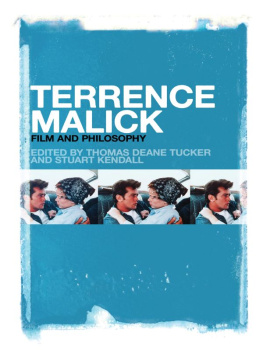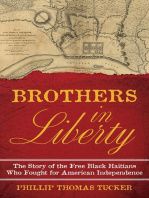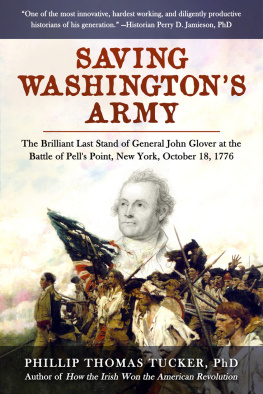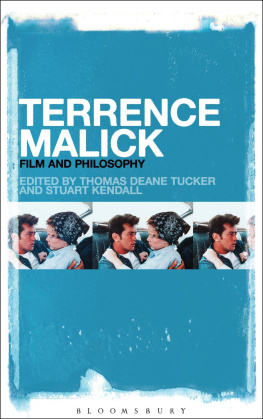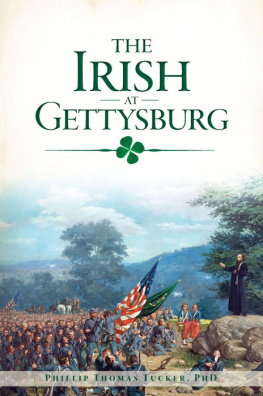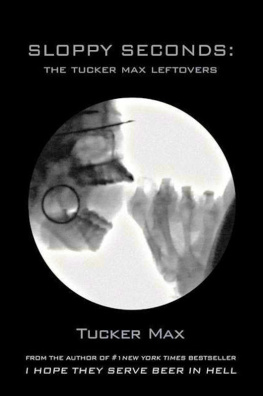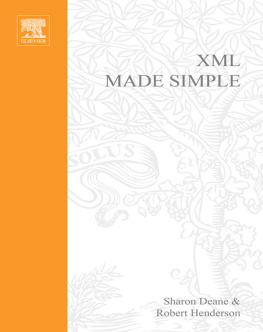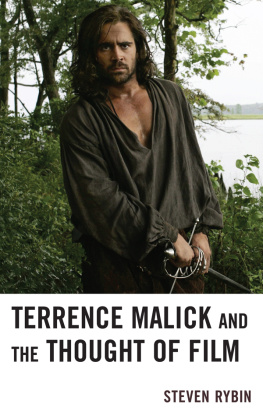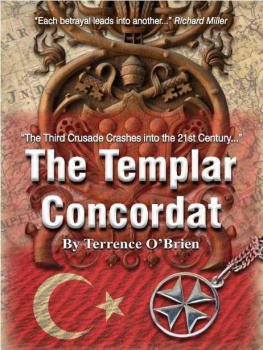Tucker Thomas Deane - Terrence Malick
Here you can read online Tucker Thomas Deane - Terrence Malick full text of the book (entire story) in english for free. Download pdf and epub, get meaning, cover and reviews about this ebook. year: 2011, publisher: Bloomsbury Publishing, genre: Non-fiction. Description of the work, (preface) as well as reviews are available. Best literature library LitArk.com created for fans of good reading and offers a wide selection of genres:
Romance novel
Science fiction
Adventure
Detective
Science
History
Home and family
Prose
Art
Politics
Computer
Non-fiction
Religion
Business
Children
Humor
Choose a favorite category and find really read worthwhile books. Enjoy immersion in the world of imagination, feel the emotions of the characters or learn something new for yourself, make an fascinating discovery.
- Book:Terrence Malick
- Author:
- Publisher:Bloomsbury Publishing
- Genre:
- Year:2011
- Rating:3 / 5
- Favourites:Add to favourites
- Your mark:
- 60
- 1
- 2
- 3
- 4
- 5
Terrence Malick: summary, description and annotation
We offer to read an annotation, description, summary or preface (depends on what the author of the book "Terrence Malick" wrote himself). If you haven't found the necessary information about the book — write in the comments, we will try to find it.
Terrence Malick — read online for free the complete book (whole text) full work
Below is the text of the book, divided by pages. System saving the place of the last page read, allows you to conveniently read the book "Terrence Malick" online for free, without having to search again every time where you left off. Put a bookmark, and you can go to the page where you finished reading at any time.
Font size:
Interval:
Bookmark:

Terrence Malick
Terrence Malick
Film and Philosophy
Edited by
Thomas Deane Tucker
and
Stuart Kendall

The Continuum International Publishing Group
80 Maiden Lane, New York, NY 10038
The Tower Building, 11 York Road, London SE1 7NX
www.continuumbooks.com
Copyright 2011 by Thomas Deane Tucker and Stuart Kendall
All rights reserved. No part of this book may be reproduced, stored in a retrieval system, or transmitted, in any form or by any means, electronic, mechanical, photocopying, recording, or otherwise, without the written permission of the publishers.
Library of Congress Cataloging-in-Publication Data
Terrence Malick, film and philosophy / edited by Thomas Deane Tucker & Stuart Kendall.
p. cm.
Includes bibliographical references and index.
ISBN-13: 978-1-4411-5003-5 (hardcover : alk. paper)
ISBN-10: 1-4411-5003-X (hardcover : alk. paper) 1. Malick, Terrence, 1945 Criticism and interpretation. I. Tucker, Thomas Deane, 1962- II. Kendall, Stuart.
PN1998.3.M3388T47 2011
791.430233092dc22
2010048884
ISBN: HB: 978-1-4411-4895-7
Contents
Stuart Kendall and Thomas Deane Tucker
Steven Rybin
John Bleasdale
Thomas Wall
Thomas Deane Tucker
Matthew Evertson
Ian Rijsdijk
Stuart Kendall
Russell Manning
Robert Sinnerbrink
Elizabeth Walden
Notes on Contributors
John Bleasdale is a film scholar and Professor at Universit Ca Foscari Venezia.
Matthew Evertson is an Associate Professor of English at Chadron State College in Nebraska and a scholar of American literature with a specialty in the literature of the Great Plains. He is the author of numerous articles on Stephen Crane, Willa Cather, and Teddy Roosevelt. His book Strenuous Lives: Stephen Crane, Theodore Roosevelt and the American 1890s will be published by University of Alabama Press in 2011.
Stuart Kendall is an independent scholar working at the intersections of visual and critical studies, poetics and theology. In addition to numerous articles and reviews, he is the author of Georges Bataille, a critical biography, published by Reaktion Books, and the editor and translator of eight volumes of diverse writings in visual and critical studies by Georges Bataille, Jean Baudrillard, Maurice Blanchot, Ren Char, Guy Debord, and Paul Eluard.
Russell Manning is a Postdoctorate Fellow at the Institute for Citizenship and Globalisation at Deakins University in Australia.
Ian Rijsdijk teaches a variety of film studies and media courses at The Center For Film and Media Studies at University of Capetown. He is currently working in the field of ecocriticism and film.
Steven Rybin is an Instructor of Film at Georgia Gwinnett College. He received an interdisciplinary Ph.D. in Film Studies and Philosophical Aesthetics from the School of Interdisciplinary Arts at Ohio University in Athens, Ohio, after completing his MA in Film Studies from Emory University in 2005. He has taught classes in film aesthetics, art cinema, film authorship, film history, and interdisciplinary courses on the arts. He is the author of The Cinema of Michael Mann (Lexington Books, 2007) and Nicholas Ray in Hollywood: Cinephilia and Film Authorship (forthcoming in 2011).
Robert Sinnerbrink was awarded his Ph.D. on Hegel, Heidegger, and the Metaphysics of Modernity at the University of Sydney in 2002. During his postgraduate research period he spent six months studying at the Humboldt Universitaet in Berlin. He has taught philosophy at a number of institutions, including the University of Sydney, UTS, UNSW, The College of Fine Arts, and Macquarie University. He is currently Lecturer in Philosophy at Macquarie University in Sydney Australia. He is Chair of the Australasian Society for Continental Philosophy and book review coeditor for the journal Critical Horizons: A Journal of Philosophy and Social Theory.
Thomas Deane Tucker is a Professor of Humanities at Chadron State College in western Nebraska. His research and teaching interests are in philosophical aesthetics, continental philosophy, and cinema studies. His work has appeared in journals such as Studies in French Cinema, Film-Philosophy Journal, and Enculturation. He is the author of Derridada: Duchamp as Readymade Deconstruction (Lexington Books, 2008). It is the first text to explore Duchamps work in the context of the theories of Derrida and deconstruction. He is currently working on a book titled The Logic of Indiffrance.
Elizabeth Walden is Associate Professor of Philosophy and Cultural Studies at Bryant University in Smithfield, Rhode Island. Her recent work addresses emerging notions of materiality and posthuman collectivities in film and visual culture.
Thomas Carl Wall is an English professor at National Tapei University of Technology in Taiwan. He received his Ph.D. from the University of Washington. His interests are in the Twentieth-Century World Literature, Twentieth-Century Continental Philosophy, Film Theory, History of Literary Criticism, and History of Western Thought. He is the author of Radical Passivity: Levinas, Blanchot and Agamben (SUNY Press, 1999).
Chapter 1
Introduction
Stuart Kendall and Thomas Deane Tucker
In the preface to his book The World Viewed: Reflections on the Ontology of Film, first published in 1971, philosopher Stanley Cavell acknowledges his gratefulness to Terrence Malick. Cavell thanks a number of other friends and colleagues, as well as his wife, in the same pages, so the comment is almost unremarkable. It is in fact a comment that would only become remarkable a few years later, after Terrence Malick had written and directed some of the most astonishing films produced during our times.
When Cavell first published his remark, Malick was 28 years old and a recent graduate of the American Film Institute in Los Angeles. Cavellseventeen years Malicks seniorhad been his professor in philosophy at Harvard in the mid-1960s and the two had stayed in touch as Malick sought and found his way from philosophy into film or, as this volume proposes to explore, from philosophy into a certain kind of filmmaking relevant to philosophy. In the second enlarged edition of his book, published in 1979, Cavell again references Malick, this time in connection with some passages from Martin Heideggers What is Called Thinking? that strike Cavell as particularly helpful to understanding Malicks then recent second film, Days of Heaven as well as to understanding the main subject of Cavells work, the ontology of film. Cavells book links a celebrated contemporary American philosopher and an inchoate contemporary American filmmaker in a unique and paradoxical relationship: here the teacher thanks his former student and references that students film work as an illustration of his own philosophical ideas. But who has taught whom, what, and when? What is the relationship between the philosopher and the filmmaker? This question resonates biographicallyproposing an ongoing friendship between these two significant culture-makersbut also and perhaps more importantly as a question posed between film and philosophy.
Cavells remarks signal the appropriateness of asking philosophical questions about Terrence Malicks works as well as the aptness of exploring the philosophical themes and problems posed by and examined in Malicks works. While it is not too much to claim that any filmno matter how derivative or aesthetically valuelessmay provide fodder for a certain kind of inquiry that can be understood as philosophical, it is also not too much to claim that Malicks films offer privileged sites for this kind of inquiry. Malicks background in philosophy and the evidence offered by the films themselves invites this style of interrogation. It is already a philosophical question to ask if the films
Font size:
Interval:
Bookmark:
Similar books «Terrence Malick»
Look at similar books to Terrence Malick. We have selected literature similar in name and meaning in the hope of providing readers with more options to find new, interesting, not yet read works.
Discussion, reviews of the book Terrence Malick and just readers' own opinions. Leave your comments, write what you think about the work, its meaning or the main characters. Specify what exactly you liked and what you didn't like, and why you think so.

